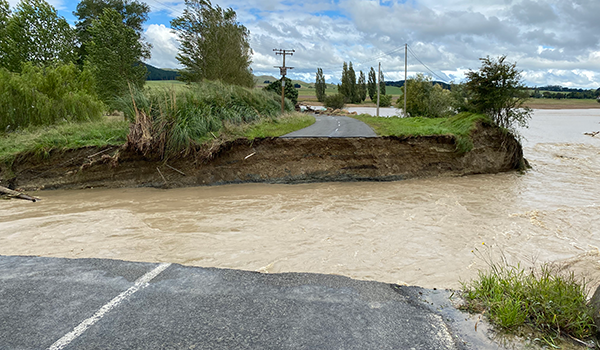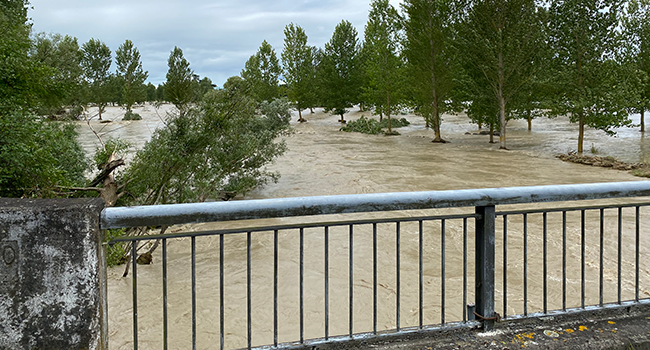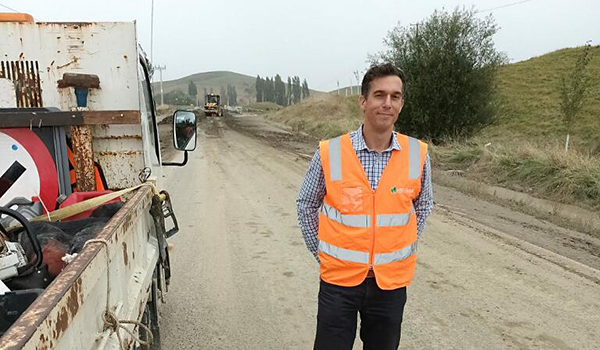My home region of Central Hawke’s Bay was recently hit by cyclone Gabrielle. After months of much higher-than-average rainfall, the deluge we were hit with over 24 hours had nowhere to go. Flood defences were breached, hillsides collapsed and slipped. Low-lying areas were flooded and smaller bridges were destroyed. About 140 homes in lower Waipawa were badly damaged due to floodwater ingress. At the height of the event, the Waipawa river broke into the Papanui Stream, from which it was diverted about 130 years ago, sending a wave of water through the valley. Sheds and fences were destroyed, homes inundated, roads scoured out. It was a miracle no-one drowned.

Post-disaster, the local council acted swiftly and put into place its civil defence plan. More rain was forecast, and flood defences had to be re-built fast. Power was out in several areas. The Waipawa river was creating a dam and threatening more homes – it had to be re-diverted. Some of our remote farming communities could not be reached by road. Contractors were mobilised, support teams deployed, and the situation was rapidly stabilised. I witnessed an inspirational community spirit and sense of common agency in those first few days, as teams pulled together, showing care, empathy, trust and respect. Two ideas have occurred to me as I reflect on the few days I was helping out with the disaster response.

Drawing down
The first is based on social exchange theory and the te ao Māori concept of ‘utu’ (the practice of reciprocal relations). I saw diverse teams – district and regional council staff, the lines company, police, animal control, construction contractors and more – coming together and working in a socially harmonious and effective way, despite the stress and fatigue of the situation. I think that the effectiveness of this diverse group of teams was in part due to their pre-existing relationships. Over time, these teams had invested in their relationships, building mutual trust and respect. When the time came, they acted swiftly, respected and trusted the civil defence leadership, which in turn deferred to local expertise and delegated control. Everyone ‘drew down’ on their social investment when the time came and the need arose.
I think that the effectiveness of this diverse group of teams was in part due to their pre-existing relationships. Over time, these teams had invested in their relationships, building mutual trust and respect. When the time came, they acted swiftly, respected and trusted the civil defence leadership, which in turn deferred to local expertise and delegated control
Floating
Not being able to operate heavy machinery or fix wastewater treatment plant, I was not much practical help to the teams responding to cyclone Gabrielle. So a colleague and I decided to pack several boxes of water bottles and took to the road, visiting work crews around the region who were removing trees, clearing slips, re-building flood defences, rescuing animals and so on. We found that everyone was grateful for an extra bottle of water, but even more so, to have someone who had time for a chat. People downloaded their thoughts and feelings onto us, and we listened. As we floated between teams, asking ‘how are you?’ and ‘do you have everything you need?’, we were able in several cases, to connect people, needs and resources. Someone needed another truck and loader, someone else had a spare truck and loader. Radios were needed, and spare radios were found. A waste transfer station needed an extra operator loader, and we had earlier spoken to a contractor offering help. It seemed useful to have the ability to ‘float’ between teams, listening, encouraging, and connecting needs and resources in real time.
As we floated between teams, asking ‘how are you?’ and ‘do you have everything you need?’, we were able in several cases, to connect people, needs and resources. Someone needed another truck and loader, someone else had a spare truck and loader
So often terms like ‘resilience’, ‘social capital’ – or even phrases like ‘mutual respect’ – can seem like the sort of buzz words or abstractions found only in government reports and academic journals. But the events of the past few days underscore to me… they are in fact part of the backbone of healthy community
 Dan Davis is the Operations Manager of HSE Global New Zealand. As part of the HSE Global, Dan helps organisations evolve from a traditional view of safety as a cost to business, to a strategic view of health and safety as a driver of business excellence, culture change, high performance, and high engagement.
Dan Davis is the Operations Manager of HSE Global New Zealand. As part of the HSE Global, Dan helps organisations evolve from a traditional view of safety as a cost to business, to a strategic view of health and safety as a driver of business excellence, culture change, high performance, and high engagement.

